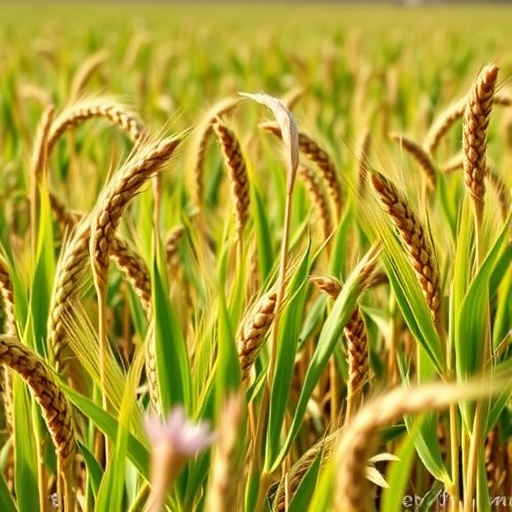In the complex interplay between agriculture and environmental health, recent studies have unveiled significant insights into the effects of glyphosate—a widely used herbicide—on crop yield and physiology. One particularly noteworthy investigation focuses on niger, scientifically known as Guizotia abyssinica, a vital oilseed crop in several regions. This research sheds light on the hormetic effects glyphosate may have, presenting a paradox where low doses could potentially stimulate plant growth rather than hinder it.
Niger has gained prominence in agricultural circles due to its robust oil content and resilience in adverse conditions. The growing demand for natural oils and sustainable crops has heightened interest in maximizing the yield and productivity of this oilseed. However, the application of chemical herbicides like glyphosate is a double-edged sword; while they offer effective weed control, their implications for crop health are increasingly scrutinized.
The study led by Ghafori and colleagues highlights how low concentrations of glyphosate can lead to enhanced growth parameters in niger plants. This principle of hormesis, whereby a substance that is toxic at high doses may have beneficial effects at low doses, complicates our understanding of glyphosate’s role in modern agriculture. Researchers observed that moderate exposure to glyphosate resulted in elevated levels of certain growth hormones, potentially leading to accelerated germination and improved overall plant vigor.
Field experiments provided robust evidence supporting these findings. The researchers meticulously detailed how treatment with glyphosate at specified concentrations positively influenced not just the growth rate, but also enhanced physiological responses. This was measured through key indicators like chlorophyll content and water use efficiency, both critical factors for the survival and productivity of crops in fluctuating environmental conditions.
As the research progressed, the investigation also focused on the implications for crop yield. The results indicated that niger subjected to controlled doses of glyphosate demonstrated substantial improvements in seed yield. This is particularly relevant given the increasing pressure on farmers to produce higher yields in the face of climate change and evolving pest pressures. By employing glyphosate strategically, farmers could potentially harness its benefits while minimizing detrimental impacts on the ecosystem.
However, despite the promising findings, the nuances of this research should not be overlooked. The authors emphasized the importance of dose management when it comes to glyphosate application, cautioning that improper use could lead to detrimental effects, including impaired plant health and reduced agricultural sustainability. Therefore, the concept of an optimal dosage emerges as a crucial factor that farmers and agronomists must consider when incorporating this herbicide into their crop management strategies.
Further investigation into the long-term effects of glyphosate utilization on soil health and biodiversity is also imperative. While the current study showcases short-term yield benefits, broader ecological impacts must be assessed to ensure that such practices do not come at the cost of soil vitality and ecosystem stability. Scientists advocate for a balanced approach, blending contemporary agricultural practices with ecological stewardship, to create a more sustainable farming landscape.
Complementing this research, the issue of glyphosate resistance has also gained traction within the academic and farming communities. With the rise of glyphosate-resistant weeds, strategic integration of herbicide applications with cultural and mechanical methods is critical. Understanding the hormetic effects of glyphosate could pave the way for innovative management practices that amplify crop resilience against herbicide resistance.
The publication of the findings in Environmental Science and Pollution Research underscores the article’s relevance in guiding agricultural policy, particularly in regions reliant on niger as a staple crop. As global interest in sustainable and organic farming increases, the insights gleaned from this research may inform future practices and regulations regarding herbicide use worldwide.
In conclusion, as the agricultural community continues to grapple with the complexities of herbicide usage and development, studies like these are invaluable. They not only highlight the dual nature of substances like glyphosate but also inform strategic decision-making for enhanced crop production. As the dialogue around sustainable agriculture evolves, such research will play a pivotal role in shaping practices that enhance both yield and environmental health.
This investigation on glyphosate’s hormetic effects on niger sets the stage for broader discussions on sustainable farming practices. It invites stakeholders to rethink traditional methods while advancing our collective understanding of plant-herbicide interactions. As we strive for balance in agricultural systems, the promise of beneficial herbicide application is an exciting frontier awaiting further exploration.
Subject of Research: Hormetic effects of glyphosate on niger (Guizotia abyssinica)
Article Title: Hormetic effects of glyphosate on niger (Guizotia abyssinica): field insights into growth, physiology, and yield responses.
Article References: Ghafori, A., Zahedi, M., Karimmojeni, H. et al. Hormetic effects of glyphosate on niger (Guizotia abyssinica): field insights into growth, physiology, and yield responses. Environ Sci Pollut Res (2025). https://doi.org/10.1007/s11356-025-36945-9
Image Credits: AI Generated
DOI:
Keywords: Glyphosate, Hormesis, Niger, Guizotia abyssinica, Crop Yield, Agricultural Sustainability, Herbicide Resistance.




